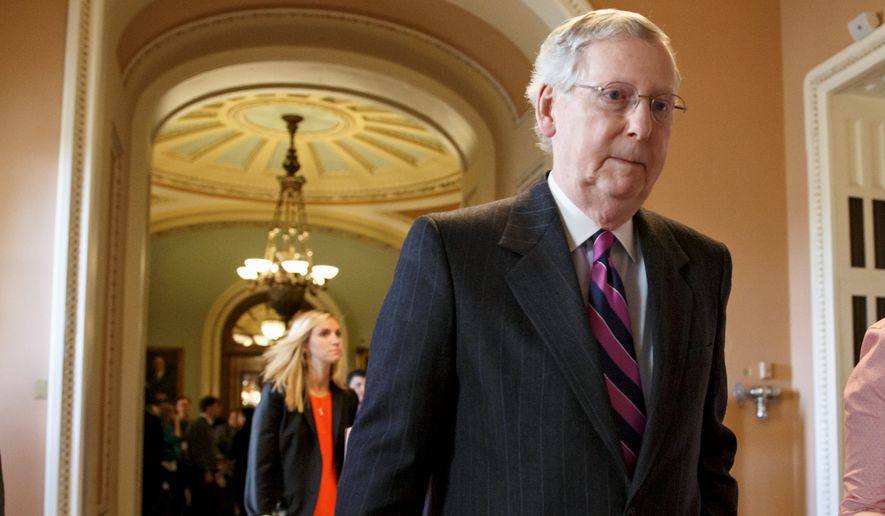With the lame-duck Congress failing to advance bipartisan surveillance-reform legislation, President Obama faces an uphill climb next year with his plans to end the National Security Agency’s mass collection of phone records.
The contentious debate will be renewed in the new Congress as Republicans take control of the Senate, after senators fell two votes short of the 60 needed to proceed on the USA Freedom Act on Nov. 15. Administration aides are saying they don’t expect any more attempts to bring back the bill this year.
But analysts say Mr. Obama does have one bit of leverage with Republicans: The current law authorizing the NSA’s bulk collection of phone records expires on June 1, and many GOP lawmakers want to keep the program in some fashion.
“The clock is ticking on authorization,” said Mike Daniels, a specialist on technology and security at the conservative-leaning American Enterprise Institute. “The government clearly needs to do some of this [data collection] to protect the country. Clearly the NSA and the intel community want it desperately.”
So do powerful Republicans such as incoming Senate Majority Leader Mitch McConnell of Kentucky, who argued that the USA Freedom Act would have curtailed the government’s counterterrorism operations.
The White House didn’t respond to inquiries about the administration’s plans for resurrecting the legislation.
The proposal, supported by the administration, would have banned the bulk collection of Americans’ phone records in the wake of the infamous revelations by fugitive NSA contractor Edward Snowden. The bill would have required the government to show reasonable suspicion that a target of surveillance is associated with international terrorism.
The measure also would have limited the scope of data collection by not allowing the government to collect records relating to a geographic region or a particular service provider.
Another factor playing into the debate is the widespread concern in recent months about the potential for “lone wolf” terrorists inspired and/or trained by the Islamic State group to launch attacks on the U.S.
“Those expiring provisions are going to provide the kind of pressure or wedge issue that surveillance advocates just might need to be able to actually get a deal,” said Patrick Eddington, a former CIA analyst and a specialist on civil liberties at the Cato Institute. “That’s where this is going to play itself out.”
The NSA and the intelligence community are most concerned with losing the authority to conduct “roving wiretaps” if the current law expires, he said.
“With the proliferation now of smartphones and tablets and other mobile devices, law enforcement needs the ability ultimately to keep tabs on particular individuals that they believe are suspects,” he said.
Mr. Eddington said privacy advocates still plan to push for tougher amendments such as a prohibition of taxpayer money to search the Section 702 database of Foreign Intelligence Surveillance Act, which contains the contents of Americans’ communications picked up by NSA overseas collection while targeting foreigners.
A bipartisan coalition in the House failed in an effort to include it in the legislation earlier this year.
Some lawmakers also are expected to renew the call to prohibit the use of taxpayer money to force technology companies to build in, deliberately, “back doors” into their systems to facilitate surveillance. For example, journalist Glenn Greenwald revealed earlier this year that Cisco routers were routinely intercepted by the NSA without Cisco’s knowledge and equipped with hidden surveillance tools.
“Both of these issues have to be urgently addressed,” Mr. Eddington said. “Talk about the potential losses for companies that are inevitably going to happen if customers around the world get the impression that American technology products are compromised in order to create additional pathways for the NSA to conduct global surveillance.
“This isn’t simply about privacy and civil liberties, although that’s obviously the core of it. This is also about American jobs and American competitiveness,” he said.
Civil liberties groups say the debate must be renewed soon.
“A huge majority of Americans has said time and again that they want and deserve security without sacrificing privacy and liberty,” said Emily Sheketoff, executive director of the American Library Association’s Washington office. “When the USA Patriot Act’s renewal is debated in the next Congress, ALA and our more than 55,000 members will be back to demand changes in the law that answer that call. Patriot Act protectionists will thwart the American people again only at their political peril.”
As reform advocates and hawks prepare to renew the debate, Mr. Daniels cautioned that the traditional pattern of Republican lawmakers being reliably pro-defense is changing.
“What surprised me as I’ve talked to a lot of Republicans on the House side, especially people who’ve come in the past one or two terms, is that there doesn’t seem to be as strong a bloc as there used to be on the national security and defense side,” Mr. Daniels said. “The people who’ve come in don’t have any background in national security and defense. They really are one- or two-issue kinds of folks who are basically here to cut the deficit or to slow down government spending. I don’t know that you’re going to get the kind of strength on the Republican side on this issue that we’ve had in past years.”
• Dave Boyer can be reached at dboyer@washingtontimes.com.




Please read our comment policy before commenting.